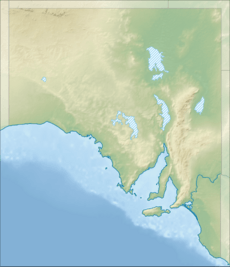Butchers Gap Conservation Park facts for kids
Quick facts for kids Butcher Gap Conservation ParkSouth Australia |
|
|---|---|
|
IUCN Category III (Natural Monument)
|
|
| Nearest town or city | Kingston SE |
| Established | 29 March 1990 |
| Area | 1.8 km2 (0.7 sq mi) |
| Managing authorities | Department for Environment and Water |
| Website | Butcher Gap Conservation Park |
| See also | Protected areas of South Australia |
Butcher Gap Conservation Park is a special place in South Australia. It is a protected area located near the town of Kingston SE. This park helps keep nature safe. It was officially made a park in 1990. The park looks out over Lacepede Bay.
Contents
What Makes This Park Special?
Butcher Gap Conservation Park is important for many reasons. It has different types of land. These include sand dunes and wet areas. The park also has two lakes called Salt Lake and Butchers Lake. A drain called Butcher Gap Drain runs through the park.
Plants and Habitats
The wet areas in the park have many plants. You can find dense South Australian swamp paperbark trees there. These trees grow over a type of "marine meadow." Other parts of the park have coastal scrub. This is a type of bushland found near the coast.
Home for Birds
The park is a great home for many birds. Especially during certain seasons, many birds come to visit. These include birds that travel long distances. They are called migratory birds. The wet areas are important for different kinds of waterfowl. These are birds that live near water. Some migratory waders also visit the park.
The Orange-bellied Parrot
Butcher Gap Conservation Park is a very important place for the orange-bellied parrot. This bird is an endangered species. This means there are very few of them left in the world. People have seen these parrots feeding in the park. They eat plants like two-horned searocket. They also find food in the samphire habitat around Salt Lake. Samphire is a type of plant that grows in salty areas.
Why is it Protected?
The park is protected to keep its unique environment safe. It is classified as an IUCN Category III protected area. This means it is important for its natural features. It is like a natural monument. This classification helps make sure the park's special plants and animals are looked after.
 | Mary Eliza Mahoney |
 | Susie King Taylor |
 | Ida Gray |
 | Eliza Ann Grier |


